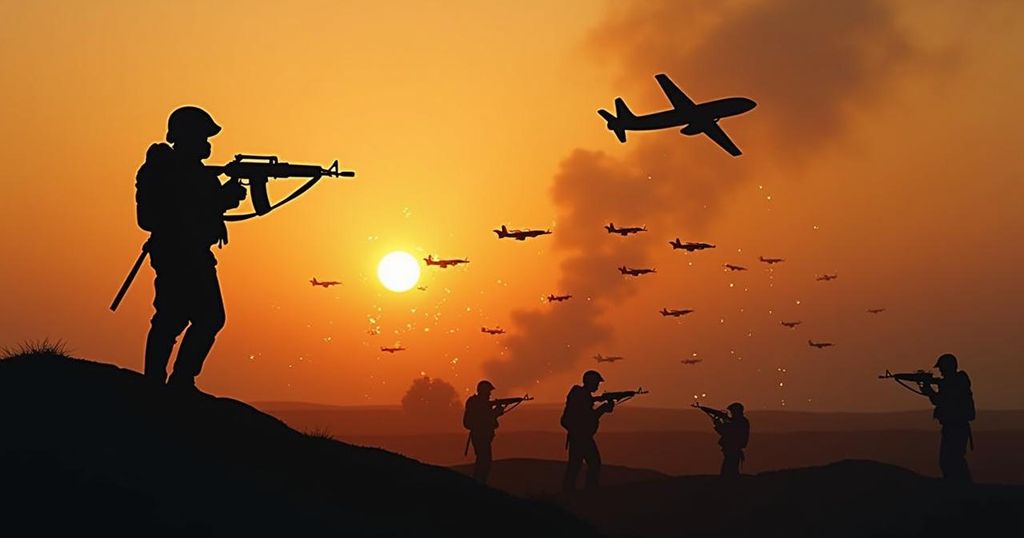Israeli Airstrikes Target Hezbollah Leadership Amid Regional Tensions
Israeli airstrikes have killed another senior Hezbollah leader, Nabil Kaouk, amid ongoing military actions targeting the militant group following the death of their leader, Hassan Nasrallah. Concurrently, Israel targeted Houthi facilities in Yemen in retaliation for missile attacks on its territory. Significant casualties have been reported on both sides, raising concerns over future escalations.
The Israeli military announced that it has conducted an airstrike resulting in the death of Nabil Kaouk, a prominent member of Hezbollah’s leadership, marking him as the seventh senior official from the group to be killed within a span of just over a week. This escalating barrage comes amidst Hezbollah’s significant losses, particularly following the recent demise of their leader, Hassan Nasrallah. The Israeli airstrikes specifically targeted a location in Beirut on Saturday, where Hezbollah confirmed that additional senior commander Ali Karaki was also killed during an operation deemed to have eliminated at least 20 members of the militant group involved in key command roles.[1] This necessary action is described as an attempt to dismantle the leadership structure of Hezbollah, severely affecting its operational capabilities. Simultaneously, Israel executed airstrikes against Houthi military installations in Yemen, which had recently launched attacks targeting Israeli territory, including missile strikes aimed at Ben Gurion Airport. The Israeli military claimed to have targeted significant facilities, including power plants and ports, aimed at mitigating further threats from these Iranian-aligned rebels. Statements from U.S. officials acknowledge the gravity of the situation, with National Security Spokesman John Kirby remarking on Hezbollah’s struggle to maintain its command structure given the losses incurred due to Israeli actions. Kirby emphasized, “I think people are safer without him walking around. But they will try to recover. We’re watching to see what they do… Much of their command structure has now been wiped out.” As the Israeli operations continue, the humanitarian toll in Lebanon has escalated with over a thousand casualties reported, leading to widespread displacement and destabilization within the country. The United States has advocated for a temporary cease-fire, a proposal that remains unresolved amid ongoing tensions. Overall, these developments signal a potential escalation towards all-out conflict, with fears mounting over the implications for regional stability as both Hezbollah and Israel prepare for an extended confrontation. Both militaries appear poised to act aggressively, leading to uncertain consequences for the civilian populations caught in the crossfire of this enduring conflict.
The recent Israeli airstrikes represent a significant escalation in the ongoing hostilities between Israel and Hezbollah, a Lebanese militant group backed by Iran. Following the killing of notable leaders within Hezbollah, including Hassan Nasrallah, the militant group is grappling with formidable losses that challenge its command structure and operational effectiveness. Concurrently, the conflict has spread to encompass the Houthis in Yemen, a group also aligned with Iran, whose recent missile attacks prompted Israeli retaliation. This complex situation evokes concern regarding a potential broader conflict in the Middle East, as the humanitarian crisis unfolds in Lebanon amidst increased military action. The current tensions are intertwined with broader geopolitical dynamics, notably Iran’s influence in the region and the longstanding animosity between Israel and Hezbollah, heightened following mutual escalations triggered by recent trigger events.
In summary, the recent Israeli airstrikes that have decimated Hezbollah’s senior leadership represent a critical moment in the ongoing conflict, prompting concerns over potential retaliation and further escalation. With significant losses already impacting Hezbollah’s command and operational capacity, the geopolitical landscape remains dangerously unstable. Concurrently, the response to Houthi aggression underscores Israel’s commitment to counter threats from Iranian-aligned groups, adding another layer of complexity to the regional security situation.
Original Source: www.pbs.org




Post Comment